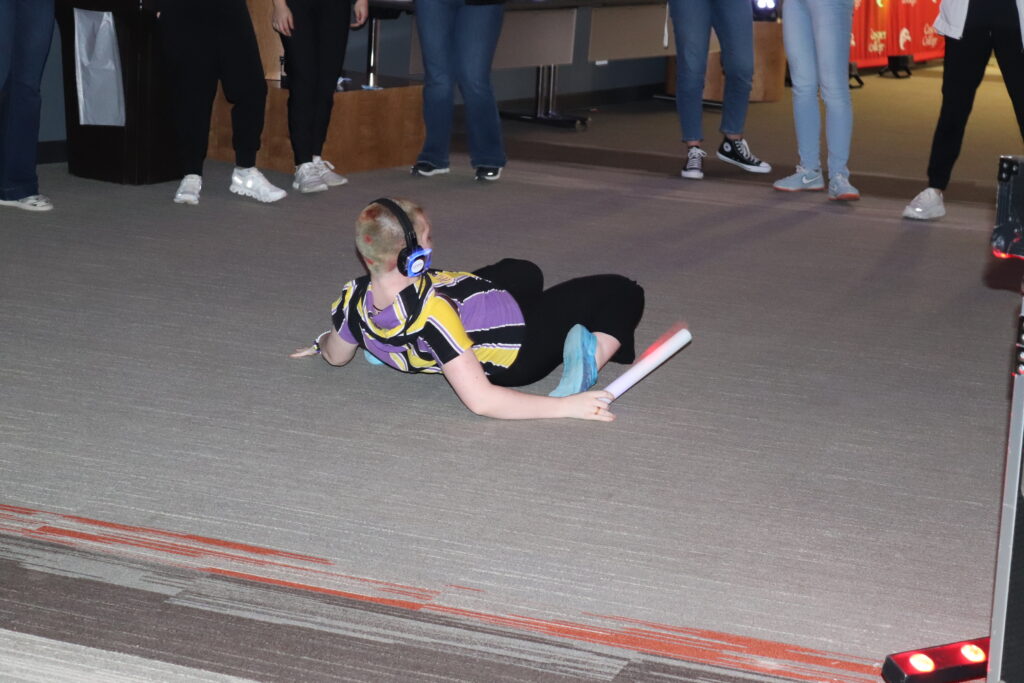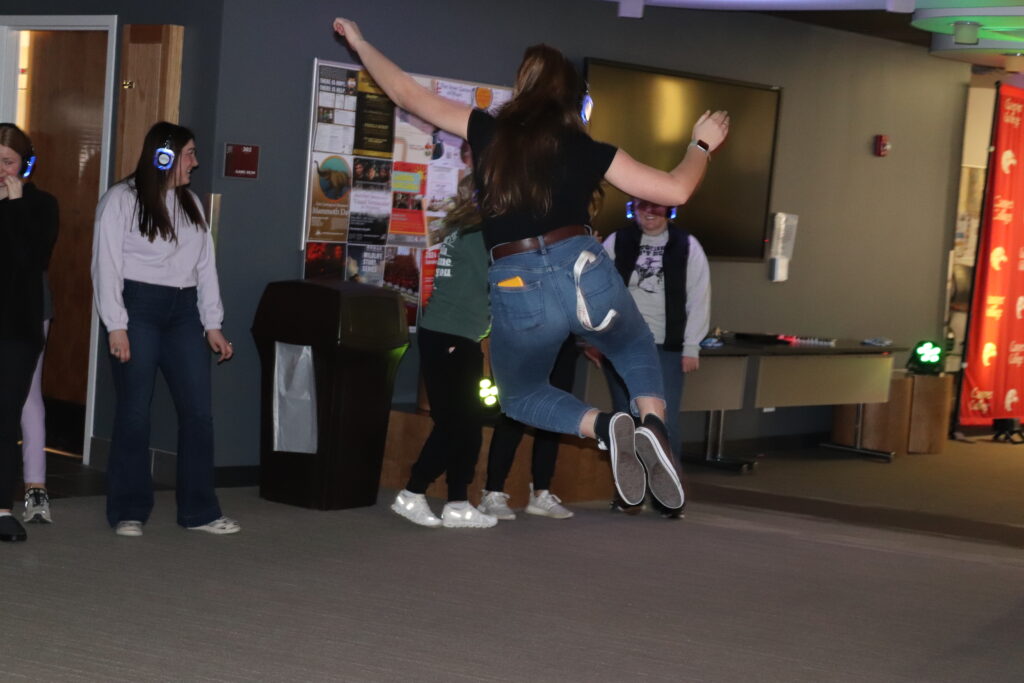Aliesia Berryman
Chinook Writer
Avy Overstreet
Contributor
Casper College event planners are having a difficult time reaching out to and engaging with students in a world where students communicate chiefly through social media and who are more likely to be a commuter student.
Resident Hall coordinator, Elizabeth Dobson, said, 32% of traditional-aged students and 16% of all full-time students live on campus.
CC hosts many events on campus aimed to engage students socially and to give them an opportunity to relax from the stresses of school. On Thursday, Feb. 29, Student Life Coordinator, Devin Fulton, hosted a silent disco in the T-bird nest. The event featured flashing lights, snacks, refreshments, and light up foam noodles.

Rae Mann tearing up the dance floor.
Rae Mann, a museum studies major from North Carolina, attended the disco and tore up the floor dancing. They took the floor multiple times during a dance-off one of the Djs started.
“I have always loved dancing, but doing so in public was not always seen as a good thing,” Mann said, referring to their high school experiences. “Nobody is judging anyone here. I found a home in Casper.”
When asked to rate the silent disco event five other students gave it an eight out of ten or higher. Emily Martinez, a nursing student, even gave it an eleven.
Katlynn Gardener, a graphic design major from Washington, worked for eight hours before attending the disco and still said she had fun. She too rated the event, “How could it not be an 8 if you get baja blast?” she asked us and she took a sip of her mountain dew beverage.
After the event, Fulton shared that around fifty students attended the event at any one time. Of other events hosted on Thursdays, Fulton said, the most popular events are bingo and casino nights.

Yet, there are some events that bring in as little as five people. Out of approximately four-thousand students that’s less than 0.02%.
Foundation member and Associate Director of Development and Alumni Engagement, Ann Dalton, and her co-worker Rachel Macy are the main protagonists for CC’s homecoming games.
Case Western Reserve University says, homecoming in college is seen as something that brings students and alumni together and is typically characterized with a homecoming court, dance, and games. While Dalton and Macy attract many alumni to the games, they admit they struggle to engage current students.
Dalton and Fulton agreed that attracting commuters, who make-up the majority of CC students, to events is difficult.
“When I get home, I don’t want to come back to campus and brave the Wyoming wind.” Fulton said.
Macy said, on top of not wanting to leave after coming home from a long day, getting the word out to students is a different endeavor than just five years ago.
The Foundation and Alumni Association sends emails and text messages but the association found that students unsubscribe from the services because they receive too many messages.
Fulton also does various things in order to get the word out about events. CC students get an email from him at the beginning of every week detailing what is going on each day. He is also exploring using a new app called Band, which is free for use.
“The challenge is trying to reach students where they are,” Macy said.
According to recent studies, phone and social media usage increased due to the COVID-19 pandemic.
Dalton said the foundation posts ads around campus, as well as on Facebook to spread information about events and news, but there is a chance the majority of students at CC get most of their information from Instagram instead.
In January, Pew Research Center reported that while 67% of people aged 18-29 use Facebook and 78% of them use Instagram. In 2021, PRC also reported that more than eight-in-ten Americans get news from digital devices.
The COVID-19 pandemic forced people to communicate mostly through the internet rather than in person. This trend is still prevalent five years after the start of the pandemic. The Mckinsey Health Institute found last April that the generation which spends the most time on social media is Gen Z.
Mckinsey also says, “While social media and tech consistently have positive impacts across all age cohorts, the negative impact increases substantially for younger ages.”
Event and extracurricular activity participation could potentially help with this problem.
In 2019 Ohio State University’s Center for the Study of Student Life found “that college student involvement is positively related to academic performance, cognitive development, well-being, leadership and multicultural awareness.”
Involvement in extracurricular activities and events can be an important part of the college experience, but quick-changing technology means that CC event planners need to adapt accordingly to engage their student body.
